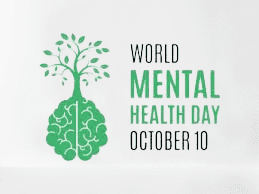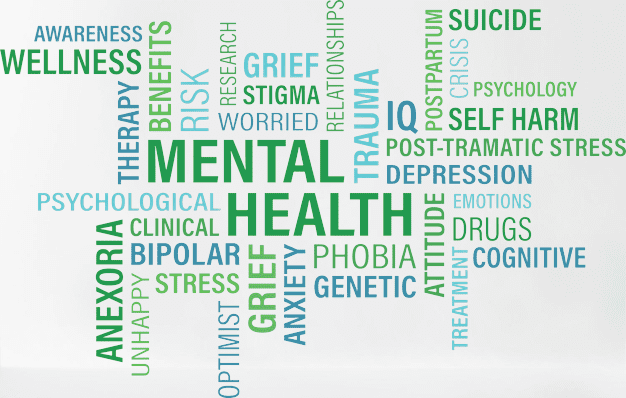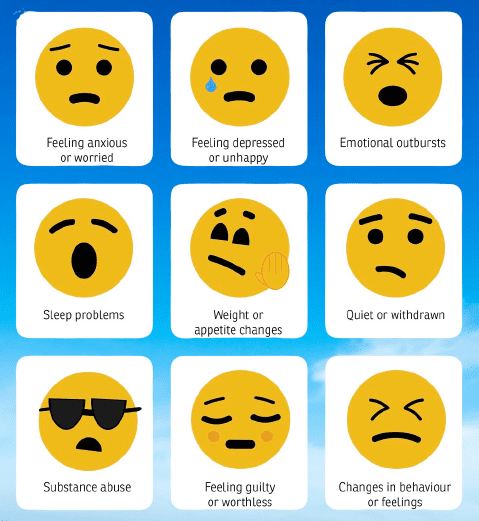World Mental Health Day: World mental health day is an important health awareness event witnessed every year on 10 October to create awareness and promote the importance of mental health in one’s life and society. World Mental Health Day aims to educate people about the stigma of mental illness, and encouraging people around the world to support the cause, and establish a healthy environment in all aspects of life to support mental health.

An individual’s mental health plays a vital role in shaping a healthy society and nation. It is imperative to have the mental and physical health to achieve a good and balanced life. Recent unprecedented global events like the COVID pandemic and Wars have brought a global crisis for mental health, affecting lakhs of people worldwide, which definitely requires the attention and active participation of the organizations and policymakers worldwide to help fight against the treatment gap and facilities needed to support mental health.
World Mental Health Day plays a crucial role in bringing people together to support each other to fight mental health issues by organizing various awareness campaigns and urging others to participate and make use of the opportunity to understand the value of mental health in their surroundings. World Mental Health Day also enables global platforms for the affected people to connect with various concerned communities to share their thoughts and be vocal about their suffering and required action to be taken to support others.
World Mental Health Day
World Mental Health Day (10 October) is an international day for global mental health education, awareness and advocacy against social stigma. World Mental Health Day was first celebrated in 1992 at the initiative of the World Federation for Mental Health, a global mental health organization with members and contacts in more than 150 countries.

World Mental Health Day History
World Mental Health Day was celebrated for the first time on October 10, 1992, at the initiative of Deputy Secretary General Richard Hunter. Up until 1994, World Mental Health Day had no specific theme other than general promoting mental health advocacy and educating the public. In 1994 World Mental Health Day was celebrated with a theme for the first time at the suggestion of then Secretary General Eugene Brody. The theme for World Mental Health Day 1994 was “Improving the Quality of Mental Health Services throughout the World”
World Mental Health Day 2023 Themes
| Year | World Mental Health Day Theme |
| 1994 | Improving the Quality of Mental Health Services throughout the World |
| 1996 | Women and Mental Health |
| 1997 | Children and Mental Health |
| 1998 | Mental Health and Human Rights |
| 1999 | Mental Health and Aging |
| 2000–01 | Mental Health and Work |
| 2002 | The Effects of Trauma and Violence on Children & Adolescents |
| 2003 | Emotional and Behavioural Disorders of Children & Adolescents |
| 2004 | The Relationship Between Physical & Mental Health: co-occurring disorders |
| 2005 | Mental and Physical Health Across the Life Span |
| 2006 | Building Awareness – Reducing Risk: Mental Illness & Suicide |
| 2007 | Mental Health in A Changing World: The Impact of Culture and Diversity |
| 2008 | Making Mental Health a Global Priority: Scaling up Services through Citizen Advocacy and Action |
| 2009 | Mental Health in Primary Care: Enhancing Treatment and Promoting Mental Health |
| 2010 | Mental Health and Chronic Physical Illnesses |
| 2011 | The Great Push: Investing in Mental Health |
| 2012 | Depression: A Global Crisis |
| 2013 | Mental health and older adults |
| 2014 | Living with Schizophrenia |
| 2015 | Dignity in Mental Health |
| 2016 | Psychological First Aid |
| 2017 | Mental health in the workplace |
| 2018 | Young people and mental health in a changing world |
| 2019 | Mental Health Promotion and Suicide Prevention |
| 2020 | Move for mental health: Increased investment in mental health |
| 2021 | Mental Health in an Unequal World |
| 2022 | Make Mental Health & Well-Being for All a Global Priority |
| 2023 | Mental Health is a universal human right |
World Mental Health Day 2023
World Mental Health Day 2023 is an opportunity for people and communities to unite behind the theme ‘Mental health is a universal human right” to improve knowledge, raise awareness and drive actions that promote and protect everyone’s mental health as a universal human right.
Mental health is a basic human right for all people. Everyone, whoever and wherever they are, has a right to the highest attainable standard of mental health. This includes the right to be protected from mental health risks, the right to available, accessible, acceptable, and good quality care, and the right to liberty, independence and inclusion in the community.

Good mental health is vital to our overall health and well-being. Yet one in eight people globally are living with mental health conditions, which can impact their physical health, their well-being, how they connect with others, and their livelihoods. Mental health conditions are also affecting an increasing number of adolescents and young people.
Having a mental health condition should never be a reason to deprive a person of their human rights or to exclude them from decisions about their own health. Yet all over the world, people with mental health conditions continue to experience a wide range of human rights violations. Many are excluded from community life and discriminated against, while many more cannot access the mental health care they need or can only access care that violates their human rights.
WHO continues to work with its partners to ensure mental health is valued, promoted, and protected, and that urgent action is taken so that everyone can exercise their human rights and access the quality mental health care they need.
Tips For Mental Health Awareness
- Be Vocal and have open mindset towards Mental Health Issues.
- Keep yourself informed about the warning Signs and Symptoms of Mental Illnesses. Some of the prominent indications includes changes in sleep and eating patterns, persistent sadness, antisocial behaviour and mood changes.
- Be kind and compassionate towards other
- Don’t hesitate to avail and promote free mental health screening
- Participate in Awareness campaign and support the cause
- Learn and implement proper healthy lifestyle to improve the mental wellbeing of your family and yourself.
- Encourage and support the affected one to get diagnosed and avail proper mental health programs based on their signs and symptoms.
- Try to think about what might help you to relax. If there’s something that helps you, try to find time to fit it into your day. For example, this could be having a bath or shower. Or going for a walk or listening to music.
- If you’re feeling overwhelmed by a stressful situation, try to take a break. A change of scene may help you to relax and relieve feelings of distress, even just for a few minutes.
- Try to make time to do an activity you like on a regular basis. This could be cooking a meal, getting in touch with a friend or watching TV.
- If you’re under a lot of pressure, you may start to feel overwhelmed or out of control. Stress can also cause physical effects on our bodies.
- Paying attention to the present moment or your senses can be helpful. This is sometimes called mindfulness. You can use techniques such as meditation or breathing exercises. Or you can practice mindfulness by paying more attention to your senses while doing things you do each day, for example, while washing up or eating.
- It’s been shown that focusing on the present can help people become more aware of their thoughts and feelings. This means that instead of being overwhelmed by your feelings, it may become easier to manage them.
- It may help to put together some things that could help you when you’re struggling. A self-care kit is filled with things that normally comfort you and help you relax. For example, you could include your favourite book, pictures or photos, a stress ball or fidget toy and a comforting blanket or slippers. Or you could make a digital self-care kit on your phone. You could save photos, music, videos, messages or sayings that you find helpful. Or notes to remind yourself how to manage difficult situations.

- Learning a new skill in a group can be enjoyable, and help boost your confidence.
- You may find it helpful to do something creative, like drawing, taking photos or baking. This might help distract you from difficult thoughts or feelings. Or it may help you to understand yourself better or express difficult things in a safe way. Being creative can also feel calming or rewarding.
- Spending time in nature can help improve your mood and reduce feelings of stress and anger.
- Some people find that being with animals is calming and enjoyable. You could try pet-sitting or dog walking, feed birds from your window, or visit a local community farm.
- Connecting with others can help us have a greater sense of belonging and reduce feelings of loneliness.
- Opening up to someone you trust can help you feel listened to and supported. It could be a friend, partner or family member.
- If you’re finding things hard, talking to people who have similar feelings or experiences can sometimes help. This could be face-to-face at a peer support group, or through an online community.
- Try to build physical activity into your daily routine
- How well we sleep can impact our wellbeing and mental health. And if we’re struggling with our mental health, this can affect our sleep. Everyone’s sleep patterns are different, and it’s important to do what works for you
- Try to give yourself some tech-free time before sleep, and avoid bright screens that can affect your sleep. Instead of looking at a screen you could try listening to some music or a podcast.
- Even taking a short walk or climbing a flight of stairs can reduce stress and increase alertness. A regular exercise routine can boost one’s mood, increase concentration, and even help alleviate symptoms of anxiety and depression.
- Breathe Deep: Just try it. Take in a nice slow breath. Start from your belly; expand through your ribs, chest, and lungs. Breathe out just as slowly. Counting can help (“1, 2, 3, 4, 5 “) Repeat.
- Connect With Others: Friends, family, pets…even a casual friendly hello to a stranger can boost positive feelings, help ward off depression and anxiety, and make you feel that you are connected to others. Focus on the quality of your friendships and relationships, not the quantity. If someone helps you feel supported, happy, useful, liked or loved, or any other positive feelings, keep the connection going.
Visit the health and general awareness section by read4knowledge for more informative articles related to general awareness and health topics.
